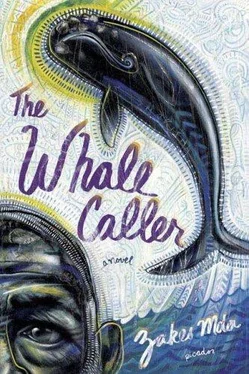They walk out of the door, and out of the gate. They tread genteelly on the pavement, arm in arm. He inhales the cold breeze from the sea with relish and rejoices in the soft fragrances of rotting kelp. He has fond memories of this ambience because at this time of the year when Sharisha was enjoying the krill in the southern seas the smells became a balm to his yearning soul. He is amazed at himself that he no longer yearns even though Sharisha has been gone for so long. He would not even have thought of her had it not been for the smells from the sea. They have walked only a few yards when Saluni extricates her arm from the genteelness and trots back to the Wendy house.
“It’s locked, Saluni. Please let’s not waste time,” he calls after her.
“Just to make sure, man, just to make sure,” she calls back.
She does this twice or thrice, and he waits patiently. Finally she defies the urge to walk back to check just one more time, and they stroll down the road.
They walk past American-type fast food franchises — the day calls for something classier than whopping burgers, deep-fried thick-battered chicken and slick pizzas that bear little resemblance to the original Italian peasant fare — and then turn into a street that prides itself on its restaurants. They stop for a while at the window of a hotel restaurant with a sushi bar, and watch the patrons sitting on cushions or mats on the floor like a congregation of some New Age religion, eating delicate oval-shaped balls of rice rolled in fish. On the low tables there are tiny bowls of different dark sauces. Other worshippers are sitting at the bar drinking some whitish sacramental drink and eating similar fare. There are chunks of white, grey, red and pink fish displayed on flat wooden rectangular rice plates. She explains to him that the fish is eaten raw, and he says that is not to his taste. Fish can only be decent when it is coated in spiced batter, fried in plenty of oil, and then eaten with golden brown chips, in the traditional manner of the Western Cape.
“You can talk about macaroni and cheese,” says Saluni, “but you don’t know anything about fish.”
“I used to live on fish when I walked the coast,” he tells her. “I lived in fisherfolk villages where they knew how to fry the fish.”
At this point the maître d’ sees them standing outside looking through the window debating the merits of his food. He goes out and invites them in.
“We have the best nigiri in South Africa,” he adds. “Yes, in this little town of Hermanus we beat top restaurants in Cape Town and Johannesburg. Our secret lies in the fact that our fish is fermented in salt and our rice is seasoned with a sweet vinegar mixture, as sushi originally used to be created in ancient Japan.”
The Whale Caller is looking at him closely, wondering how it is possible for a man to work up so much enthusiasm for mere fish and rice. Saluni declines the invitation for them both and tells the maître d’ that they would rather enjoy his decorative delicacies with their eyes from a distance.
“We also serve sushi that doesn’t include sashimi… that doesn’t include raw fish… if that’s what you are squeamish about,” the man says. He is persuasive, but Saluni explains once more that they are only interested in eating his food with their eyes, if he doesn’t mind. The friendly face changes in a flash.
“Of course I mind. You make my customers nervous watching them like that. Please go and be spectators somewhere else,” he says as he angrily walks back into the restaurant.
“I wouldn’t like to be watched when I eat either,” says the Whale Caller. “Eating should be a private matter. Like sex.”
He startles himself with this last observation. His worst nightmare is becoming a reality: Saluni has debauched him, to the extent that a simile like that can roll out of his mouth unprovoked. But all this is lost on Saluni.
“As if it is something sinful,” says Saluni. “If they want to eat in private they mustn’t come to a restaurant.”
The maître d’ draws the blinds and the remote diners are left facing white kimono-clad outlines of Japanese beauties and leafy bamboos on a red background.
“Oh, man! What did he do that for? I wanted to taste some of that sake,” wails Saluni.
“Sake?” asks the Whale Caller.
“The wine,” she explains. “It is made from rice. I understand it is wonderfully powerful. As strong as the man next to me.”
“Don’t even think about it,” he warns her. “Otherwise I might find you swimming in the bottle again and wasting your life in the taverns.”
“You look so cute when you worry about me,” she says, cackling.
There are other restaurants. Each one boldly advertises some foreign cuisine, ranging from Indian and Chinese to French and Italian. But their curtains are drawn.
“Perhaps we should change our dining strategy next time,” says Saluni. “We should dine in the daytime. Curtains are bound to be open in the daytime.”
“Perhaps we shouldn’t dine at all,” says the Whale Caller. “We should be sitting in front of a warm heater at home.”
“Don’t give up so easily, man,” she says. “You’ll see, you’ll like it once you get the hang of it. Just like the window shopping.”
They are about to give up despite Saluni’s exhortations when they chance upon a Cape Dutch house at a corner of a nondescript street. It is the only restaurant that unashamedly boasts of specialising in South African cuisine. Everyone knows that in the Western Cape when they talk of South African cuisine they mean the Cape Malay food that is a result of the melting cultures of Indonesia, India, Malaysia, Khoikhoi and Dutch. The same kind of interbreeding that brought into existence the wonderfully coloured people of the Western Cape. As in the rest of the restaurants at this time of the night, this one’s thick maroon velvet draperies are drawn as well. But at one of the windows there has been some carelessness since there is a big gap between the curtains through which Saluni and the Whale Caller can see inside.
The glass reflects their own images because of the glare from the streetlights. Therefore they have to press their faces against the panes in order to have a good look at the chefs standing in a row — the high priest and his acolytes — cutting roast lamb, beef, chicken, pork and venison behind a long buffet counter of crayfish, langoustine, perlemoen, curries, rotis, samoosas, colourful salads, pies, boboties, sosaties, pickled snoek fish, másala fish, rice, and sweetmeats such as temeletjies and the syrupy doughnuts known as koeksisters. The priests do everything in full view of the worshippers, many of whom watch in admiration as they brandish their big knives about, slicing the roasts with pomp and ceremony. Sosaties are braaied over an open fire, while the worshippers ceremonially walk the length of the altar, serving their fancy onto their plates. Then they walk to their tables, also set up like altars, each one with a candle burning idly. Worshippers are in couples. Youthful upwardly mobile lovers and jaded old-world couples from the houses of retired millionaires that dot the district. There are hardly any tourists at this time of the year.
“I find this worshipping of food obscene,” the Whale Caller whispers.
She gives him an acid glare and says, “You should count your blessings and taste every dish instead of complaining.”
“After all, sooner or later it will be digested and will surely become stools. Then it will be scorned and despised. People forget that only a few hours back they were venerating it.”
“You are the only human being outside the doctor’s rooms who talks of stools. Normal people talk of shit, man. Not stools. Not faeces. Not waste matter. Pure unadulterated shit!”
Читать дальше












